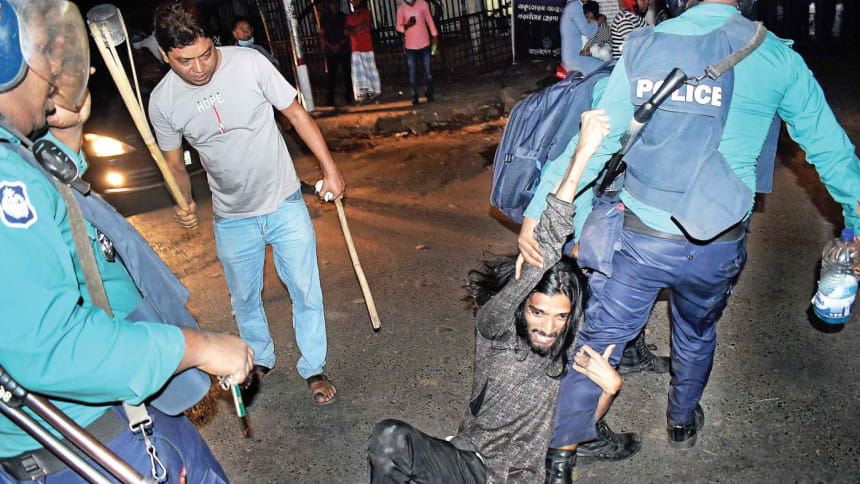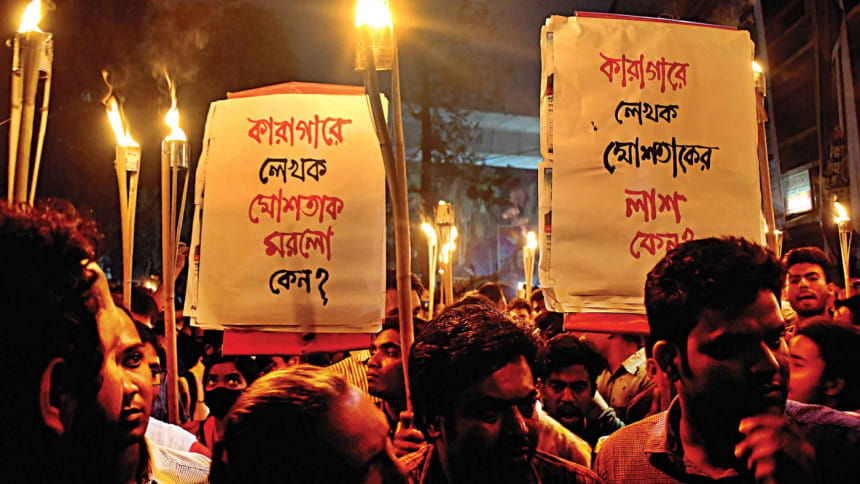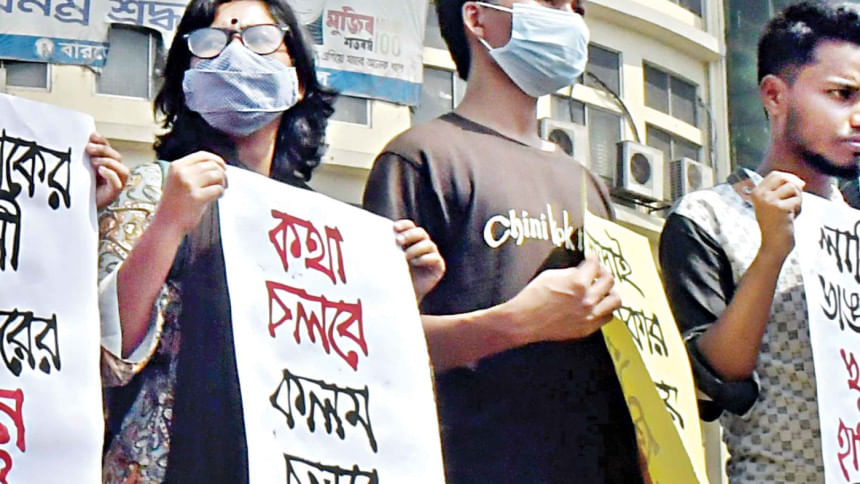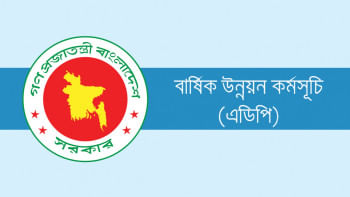UNACCEPTABLE

Condemnation poured in and people from all walks of life, especially students and teachers, took to the streets yesterday expressing anger over the death of writer Mushtaq Ahmed in jail custody.
Besides, a clash between protesters and police left several injured on Dhaka University campus.
Mushtaq died on Thursday while he was an arrestee in a case filed under the Digital Security Act. With the death of this uncompromising voice, the call for scrapping the controversial DSA got louder.
Legal experts said such a death was not only unacceptable but also shocking.
They said the detention of Mushtaq for over nine months, denying him bail so many times and his subsequent death demonstrates that people's fundamental rights to freedom of speech and thoughts have been squeezed, something which can never happen in a democratic country.
"He [Mushtaq] is a victim of government repression and [this is a] murder of freedom of expression," eminent jurist Shahdeen Malik told The Daily Star.
Calling for scrapping of the DSA, he said such a "medieval" law cannot exist in any democratic country. "We can formulate such laws if we don't care about democracy and want to block criticisms of the government."
Prof Mizanur Rahman, former chairman of the National Human Rights Commission, said, "People's voice is shrinking because of the Digital Security Act. It is an ominous sign for the state."
Terming the death of Mushtaq very painful and unacceptable, he said criticism of the government and sedition are two different things. "Mixing these two up will be a great mistake.
"I also think the judiciary should be more sensible and careful. Mushtaq was refused bail six times and kept detained for months after months."
Mushtaq used to write under the pen name Michael Kumir Thakur. His book "Kumir Chasher Diary" was published in November 2018, and he was working on another book. He was critical, on social media, of the government's handling of the coronavirus pandemic.
On May 6 last year, Rapid Action Battalion arrested him at his Dhaka home for "spreading rumours and carrying out anti-government activities". The charges were filed under the DSA and he had been in Kashimpur High Security Jail-3 in Gazipur since August 20.
The other arrestees in the DSA case are: Ahmed Kabir Kishore, a cartoonist; Didarul Islam, a member of politico-civic organisation called Rashtrachinta; and Minhaj Mannan Emon, managing director of BLE securities and shareholder-director of Dhaka Stock Exchange.
Mushtaq fainted Thursday evening. He was then taken to Shaheed Tajuddin Ahmad Medical College Hospital, where doctors declared him dead.
He was 53.

CONDEMNATION, PROTEST
Since the news of Mushtaq's death spread, people from all walks of life took to social media to vent. Many brought out processions early yesterday.
A "funeral prayer" without the body was organised in the capital around 4:30pm, demanding justice for Mushtaq and that the DSA be repealed.
Urging the prime minister to bury the "black law", Gonoshasthya Kendra Founder Zafrullah Chowdhury said, "The killer of Mushtaq is no one but the government.
"Everyone involved in [formulating and implementing] the Digital Security Act is involved in this murder," he said at the programme, organised by Bangladesh Chhatra Odhikar Parishad, in front of the National Museum in Shahbagh yesterday afternoon.
Dhaka University's International Relations Prof Tanzimuddin Khan said, "The Digital Security Act is not only choking freedom of speech but is also taking people's lives.
"Getting bail is a lawful right of a defendant. The state sends murderers and looters to Bangkok overnight but doesn't spare those who speak for justice and the people of the country."

Junaid Saki, chief coordinator of Gono Sanghati Andolon, expressed solidarity with the protest and said, "The murder of Mushtaq proves that this government is not the government of the masses. This state has turned into a murderous state and the independent institutions of this state are being used to control the people."
Blaming the prime minister and the home minister for the death of Mushtaq, former Ducsu VP Nurul Haq Nur said, "If we are not organised and united today, our situation will be like that of writer Mushtaq and there is no scope for denying that."
DU law Prof Asif Nazrul also joined the protest and blamed what he termed the black law for the "killing" of the writer.
Later, a procession was brought out from the Central Shaheed Minar premises where protesters held placards and banners and chanted slogans, demanding justice for Mushtaq.
Around 6:45pm, members of several left-wing student groups brought out a torchlight procession from TSC and were heading towards Shahbagh.
As the procession was crossing the Public Library area, police intercepted it, leading to a clash between the demonstrators and law enforcers.
Later in a statement, Samajtantrik Chhatra Front claimed that around 40 protesters were injured in the police attack. At least five other demonstrators were also detained, it said.
Mamun-ur-Rashid, officer-in-charge of Shahbagh Police Station, said, "The demonstrators hurled brick chunks at us. Six to seven policemen were injured."
Police said they detained two.
Earlier, at another protest, leaders of Samajtantrik Chhatra Front also blamed the government for Mushtaq's death and held a rally in front of Raju Memorial Sculpture in Dhaka University.
"Writer Mushtaq has died in police custody. It is a killing and the government is responsible for it," said Al Kaderi, president of the Front.
Leaders and activists of another left-wing student group blocked Shahbagh intersection around 11:00am, demanding justice for Mushtaq.
"Mushtaq's lawyer appealed for bail after his health worsened … Later Mushtaq died. This government has enacted the Digital Security Act to silence dissent," said Zahid Sujon, general secretary of Chhatra Federation.
Meanwhile, Human Rights Forum Bangladesh, a platform of the country's 20 leading rights and development organisations, said writer Mushtaq's death was a consequence of the DSA's misuse.
Issuing a statement, the forum demanded that the cause of death be revealed through a fair and neutral probe. It also demanded that the probe findings are made public.

Besides, it demanded an immediate amendment to the act and release of cartoonist Ahmed Kabir Kishore.
In a separate statement, Ain O Salish Kendra termed the DSA a "controversial" act and said it is "contradictory" to freedom of press and freedom of speech guaranteed by the constitution.
ASK said the way Mushtaq and Kishore were detained under the act and imprisoned for long has stirred up debate and discussions.
This also created a kind of fear among journalists, cultural activists, writers, researchers and mass people, which impacted negatively on freedom of the press and freedom of speech, it said.
"Undoubtedly, Mushtaq's death will fuel the fear," it added.
Besides, nine left-leaning organisations, including Jatiya Mukti Council and Manabadhikar Shongskriti Foundation, protested the death of Mushtaq, terming it a "murder".
POLICE FOIL BNP PROCESSION
A torch procession brought out by the BNP demanding justice for Mushtaq was foiled by the police in the capital's Banani yesterday.
Talking to The Daily Star, the party's Assistant Office Secretary Syed Emran Saleh Prince claimed that 30 BNP men were injured as police charged truncheons on them.
He said some 150 BNP leaders and activists had brought out the procession from Banani kitchen market area around 7:00pm.
Contacted, Barhan Uddin Rabbani, sub-inspector of Banani Police Station, said the BNP men took out the procession blocking a street.
On information, police went there and dispersed them, he said, claiming that no one was injured in the incident.

 For all latest news, follow The Daily Star's Google News channel.
For all latest news, follow The Daily Star's Google News channel. 



Comments